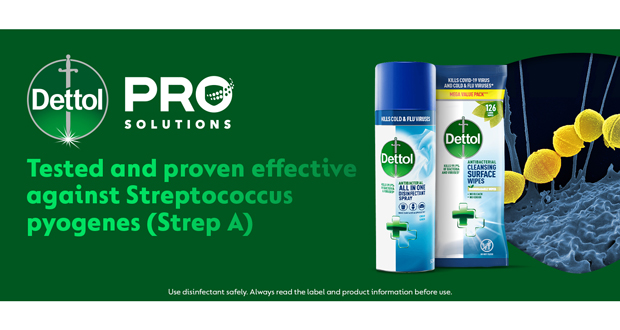In light of the rising case numbers of Strep A in the UK, Dettol Pro Solutions – Dettol’s business-to-business offering – is providing advice in terms of simple steps businesses can take to help reduce the risks of Strep A infections such as scarlet fever.
Group A Streptococcus (GAS), also known as Strep A, are a common type of bacteria found on the skin or in the throat which, under certain circumstances, can cause disease. GAS infections often present as a mild sore throat (‘strep throat’) and skin/soft tissue infections such as impetigo and cellulitis.
The latest data from the UK Health Security Agency (UKHSA) shows scarlet fever and other GAS infections remain high – there have been 37,060 notifications in England of scarlet fever this season (from 12 September to 8 January), and 1,539 of the more serious Invasive Group A Strep (iGAS) cases, although these remain rare. Notably, a total of 4,622 notifications of scarlet fever were reported from weeks 37 to 46 of the current season (2022/23), with 851 notifications received in week 46. This indicates a 357 per cent increase when compared with an average of 1,294 (range 258 to 2,008) for this same period (weeks 37 to 46) during the previous five years.
Dr Lisa Ackerley, Director of Medical and Scientific Engagement (hygiene) at Reckitt, commented: “We acknowledge the public’s concern around the increased number of Strep A infections, which are currently higher than we see in a typical year; we continue to play our part to help families, businesses and organisations reduce the spread of this and other respiratory infections. As Group A Strep infections, including scarlet fever, continue to circulate at high levels, we must all contribute to implementing and sticking to effective hygiene behaviour to mitigate transmission.”
GAS bacteria are contagious and are typically spread to others through respiratory droplets and direct contact; those who are infected spread the bacteria by talking, coughing or sneezing, which creates infectious respiratory droplets4.
To prevent GAS infections, businesses should encourage staff and customers to:
- Cover their mouths and noses with a tissue when they cough or sneeze
- Put used tissues in the waste bin
- Cough or sneeze into the upper sleeve or elbow, not the hands, if a tissue is not available
- Wash hands at key moments such as after coughing or sneezing and on arriving at work or home, with soap and water for at least 20 seconds
- Use an alcohol-based hand rub if soap and water are not available
- If hot desking takes place at work, ensure staff have the means to disinfect their work areas on arrival
- Shared items such as crockery and cutlery should be washed hygienically, preferably in a dishwasher
Stuart Bainbridge, R&D Director Reckitt Pro, commented: “Focusing cleaning and disinfecting efforts to high-touch surfaces in high-traffic areas and disinfecting frequently can help break the chain of infection. We develop Dettol products to the highest standards of efficacy to help deliver clean and hygienic environments.
“We’re keen to help businesses overcome these hygiene challenges faced at the moment – our products have been tested in independent laboratories and proven effective against a range of bacteria and enveloped viruses including Streptococcus Pyogenes (Strep A), SARS-Cov-2 and Human Influenza.
“Our Dettol Anti-Bacterial Cleansing Surface Wipes have been tested specifically against Streptococcus Pyogenes (which is responsible for Group A Strep infections), following EN1276 standard in dirty conditions and have passed the testing standards.”
Dettol Pro Solutions, which consists of a team of in-house virologists, microbiologists and medical scientists, was launched in the UK last year. The ‘better results for healthier businesses programme’ has supported the development of science-backed training materials and targeted hygiene protocols for different business sectors such as hospitality, food service, offices, and retail.





